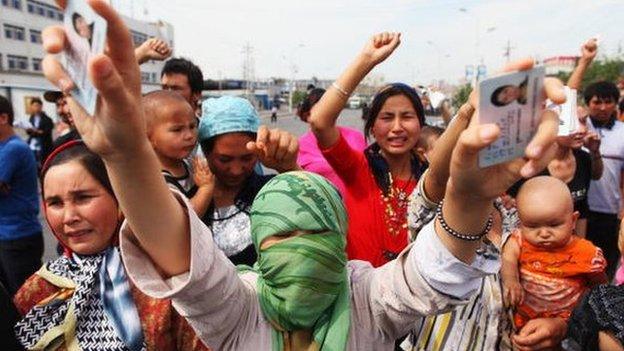China mosque demolition sparks standoff in Ningxia
- Published
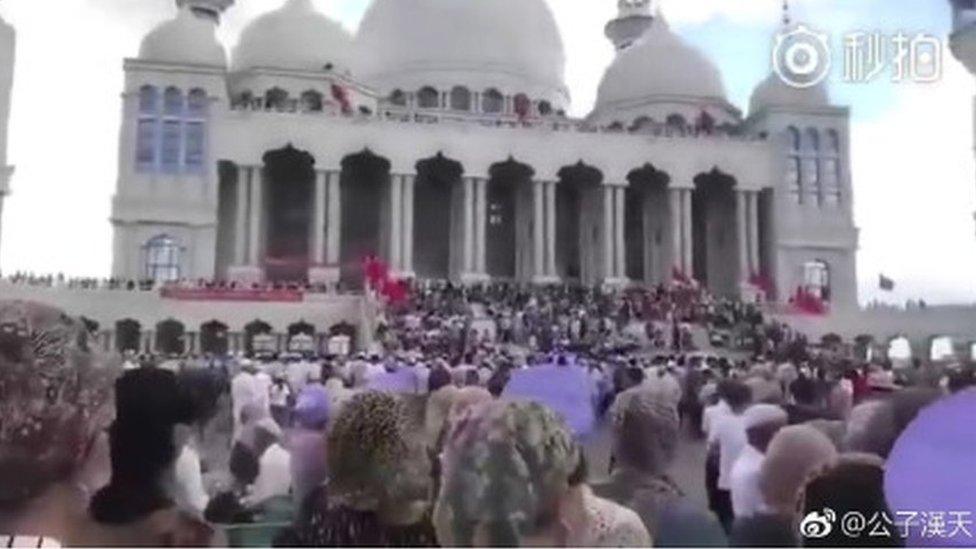
The Weizhou mosque is a towering structure that features domes and minarets in a Middle Eastern style
Hundreds of Muslims in north-western China are engaged in a standoff with authorities to prevent their mosque from being demolished.
Officials said the newly built Weizhou Grand Mosque in the Ningxia region had not been given proper building permits.
But worshippers refused to back down. One resident said they would not "let the government touch the mosque".
China has a Muslim minority of some 23 million, and Islam has been prominent in Ningxia for centuries.
But human rights groups say there is increasing official hostility towards Muslims in China, and foreign religious influences in particular.
The mosque, which has several soaring minarets and domes, is built in a Middle Eastern style.
For centuries Hui Muslim mosques were built in a more Chinese style, and it appears that the new structure is viewed by the local government as an example of a growing Arabisation of Chinese Islam, the BBC's China correspondent, Stephen McDonell, reports.
How did the protests begin?
Officials had on 3 August posted a notice that the mosque would be "forcibly demolished" as it had not been granted the necessary planning and construction permits.
Allow X content?
This article contains content provided by X. We ask for your permission before anything is loaded, as they may be using cookies and other technologies. You may want to read X’s cookie policy, external and privacy policy, external before accepting. To view this content choose ‘accept and continue’.
The notice was shared online among the ethnic Hui Muslim community, according to Reuters news agency.
Many questioned why the authorities had not stopped construction of the mosque, which took two years to complete, if it had not been granted relevant permits, according to the Hong Kong-based South China Morning Post newspaper.
Protests were held outside the mosque on Thursday and continued into Friday, say the reports. Pictures circulating on Chinese social media showed large crowds gathering outside the large white building.
One resident said talks between the Hui community and the government had reached an impasse.
"We're just in a standoff," the resident, who withheld his name, told the Post. "The public won't let the government touch the mosque, but the government is not backing down."
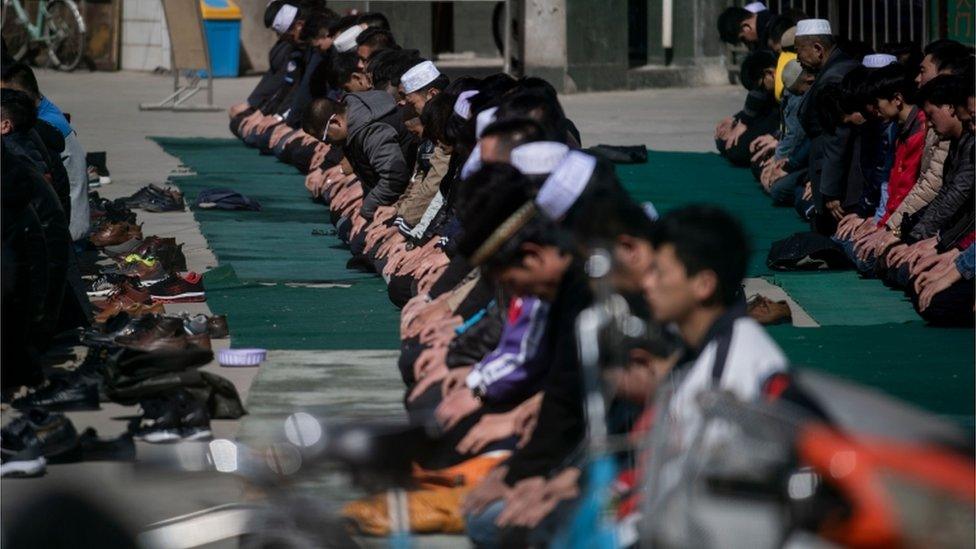
The Hui are one of China's largest Muslim groups
However, an official from the local Islamic Association said that the mosque would not be demolished entirely. He told Reuters news agency the government only wanted the structure "renovated to reduce its scale".
Later reports suggested that the authorities had agreed to remove eight domes.
But one of the protesters was quoted by the Associated Press news agency as saying that this proposal was unacceptable to the Muslim community.
The protester added that the mosque had been conducting prayers attended by thousands of people and had been built with donations from congregants.
There has been no comment so far in Chinese state media.
Film shows Muslims in 'unseen China'
Can you freely practise religion in China?
In theory, China's constitution guarantees religious freedom but in practice religious activities remain tightly controlled by the government.
Christian churches, for example, have in the past been forced to remove crosses from their roofs, after the government said the symbol broke planning rules.
In recent years, the atheistic Chinese Communist Party has become particularly wary of foreign religious influences and authorities have embarked on a campaign to "sinicise religion" - ie make it more Chinese.
As part of that, they have targeted unofficial "house churches" connected to overseas missions where millions of Chinese Christians worship.
While Hui Muslims have largely been well-integrated and left mostly free to practise their religion, they have watched as Uighur Muslims in the western Xinjiang region have faced growing government pressure.
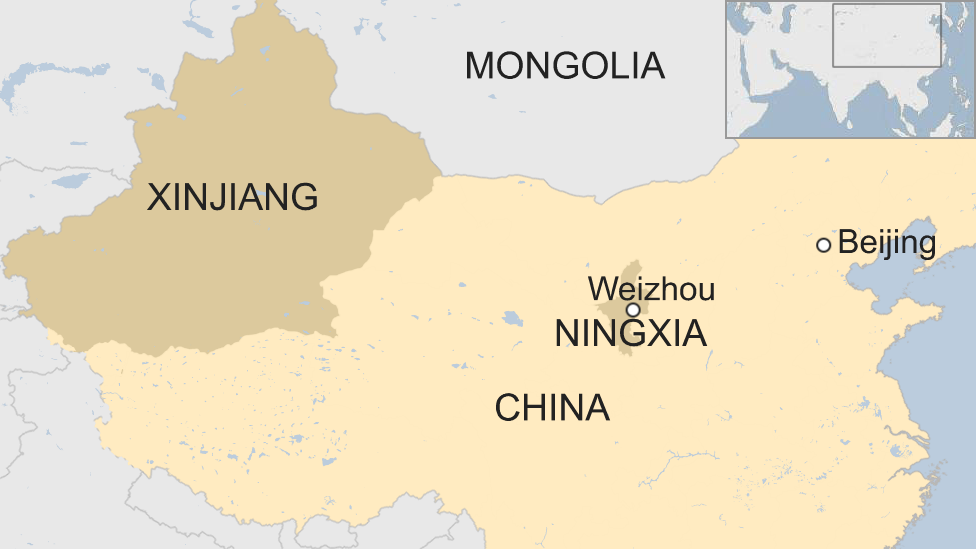
Rights groups say citizens in Xinjiang are subject to increasingly intrusive methods of government surveillance and control, with many punished for "extremist" behaviour like wearing veils in public places, or refusing to watch public TV programmes.
Thousands of Uighurs are also believed to have been forcibly sent to "education camps". According to Human Rights Watch, detainees are forced to renounce their ethnic and religious identities.
But the current move to demolish the Ningxia mosque is an indication that the government is now looking to extend control over other Muslim ethnic minorities, says rights group Amnesty International.
Earlier this year, in neighbouring Gansu province, children under 16 in the region of Linxia were banned from religious activities, in a move that alarmed Hui imams.
"It's clear that the Chinese government's hostility towards Muslims in China is not only limited to Uighurs," researcher Patrick Poon told the BBC.
"Hui Muslims are generally considered less vulnerable to crackdowns, but this incident proves that the government is determined to use a holistic and heavy-handed approach towards all Muslim ethnic minorities in China."

Hui people in China

The third largest ethnic group in China, with about 10 million living in the country - mostly in the north-west
Predominantly Sunni Muslim, the majority Islamic denomination
Unlike the ethnically Turkic Uighurs, they speak mostly Mandarin
The majority are descendants of Silk Road traders, many of whom intermarried with Mongols and the governing Han Chinese
Beijing has been more tolerant towards the Hui than the Uighur community, whose frictions with the central government have been well documented
- Published1 February 2018
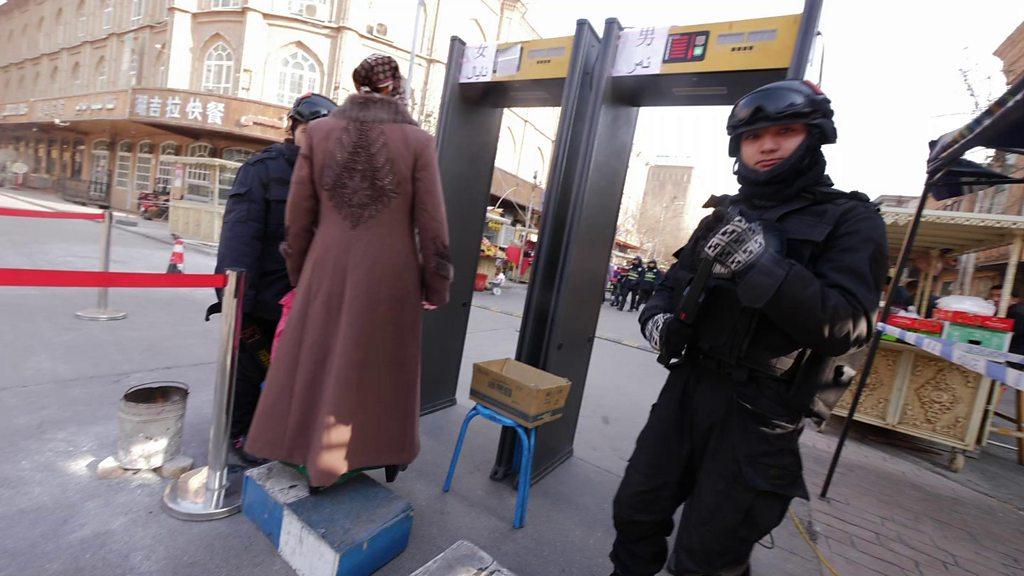
- Published2 March 2017
- Published1 April 2017
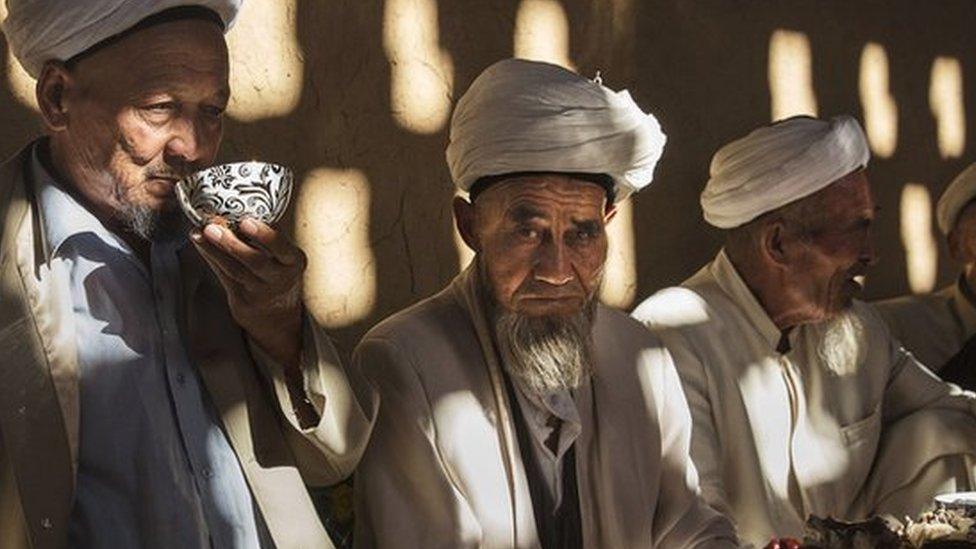
- Published26 September 2014
